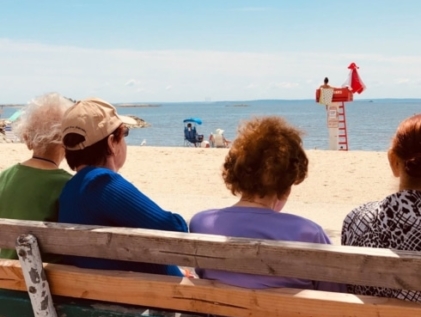Summer is officially upon us, which means that your loved one may be inclined to spend more time outdoors. Whether they enjoy soaking up the sun, reading, gardening or taking a stroll around the neighborhood, all seniors should take certain precautions to avoid the dangers that come along with the summer sun and heat. Seniors over the age of sixty-five are more prone to heatstroke and exhaustion because their bodies do not adjust to heat as well as a young person. Also, underlying health issues and some medications can affect the body’s ability to regulate its temperature.
Help your loved one stay safe and healthy this summer with these helpful tips:
Stay Cool
Air conditioning for a senior is ideal, especially on sweltering days when the breeze or a fan is insufficient. If your loved one’s home does not have central air, consider installing window units in rooms where they spend the most time. If this is not an option, seek out local senior centers or “cooling shelters” that welcome those that are vulnerable to the heat. As businesses start to re-open following the pandemic, you may also consider taking them to the library, a mall, or the movie theater to get some relief during the hottest parts of the day (remember your masks!).
Avoid Mid-day Sun
Encourage your loved one to run their errands or get in their daily walk in the early morning or early evening when the temperature tends to be cooler. Between the hours of 10 am and 6 pm, seniors should rest and avoid strenuous activities.
Stay Hydrated
Dehydration is more common in seniors due to a naturally lower volume of water in their bodies. Some seniors may also have health conditions or take medication that increases their risk of dehydration. Encourage them to drink plenty of water or juice throughout the day. Have them avoid alcohol or caffeinated beverages, though, as they can cause dehydration.
Dress Appropriately
It may seem obvious, but, on extremely hot days, seniors should wear light-colored, loose-fitting, and light-weight clothes. Hats with wide brims are also a good idea. Apply sunscreen before sun exposure and reapply frequently.
Protect the Eyes
Exposure to the sun can cause vision damage and eye irritation. Wraparound sunglasses that block 99% of UVA and UVB rays are ideal. If your senior wears contacts with sun protection, the added protection of sunglasses is still a good idea.
While spending time outdoors, always be on the lookout for signs of heatstroke and exhaustion. Sudden dizziness, nausea, headache, chest pain, trouble breathing, and fainting are all signs that your loved one may need medical attention. When in doubt, call your loved one’s doctor immediately. It’s always better to be safe than sorry!

